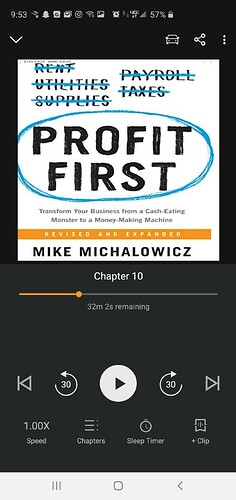More of a business side question. I’m not asking for anyone’s paycheck numbers but I got to wondering how you all decide what comes home with you. Do you have a set amount you take home each month, do you take a certain percentage? Or is it just take everything that doesn’t go to bills and taxes?
For example to keep the math easy say you bring in 1000$ per week in business do you do 35% taxes 35% operating expenses 30% take home?
My wife does direct deposit for everyone’s payroll but mine. She writes a check every Friday for us but only deposits about half of them. It’s a set amount
1 Like
I pay myself a weekly wage just like I do my employees. The rest stays in my business account until the end of the year to make the final move on how much gets transferred over to my personal account. Wages and expenses gets minused from the total turnover and the rest is yours to enjoy or keep business afloat, I’m essentially an employee of my company as well as my staff. Operating costs vary from business to business.
3 Likes
Pay your wife (if you have one) if you aren’t already. It will benefit you for tax purposes.
5 Likes
I pay myself by buying things my company needs. And only things my company needs. For example I believe I have stumbled upon a new untouched field in pressure washing. It just happened to be offshore. So the company needed to buy me a boat so I can do some market research for the company. Like most new concepts it’s very time consuming. I’m not expecting and definitive results for at least a few years
17 Likes
 don’t forget to upgrade the vessel as the business grows. Very important.
don’t forget to upgrade the vessel as the business grows. Very important.
1 Like
Weekly and very weakly. Read closely lol
4 Likes
Business Revenue Account, tax account, profit account, owners account, expenses account.
All money goes into revenue account then on the 10th and 25th a predetermined percentage of the total in that account goes into the others. So on the 10th and 25th the account balance of the revenue account will be 0. Hope that makes sense.
I practice the method from the book Profit First
3 Likes
Holy cow, I just finished that book last night! How long have you been running that system ? And how has it served you?
@SurfaceTherapy
Lol, you spend all yours on fancy new tools and equipment!
2 Likes
I’m confused on this part, she writes you a check, but about half the time you dont cash it and the amount stays in the business account? Is that correct?
I was rewarded handsomely when I got my taxes done Monday for all I had spent!
1 Like
Yep. We are kinda frugal and don’t really need that much to get by on. It starts in the business or she makes contributions to put church, or other charities. So, I get paid a set amount, we just don’t always take advantage of it. Bear in mind, I’m know businessman so probably not the best person to take advice from unless it’s something to do with getting your hands greasy
2 Likes
The Profit First by Mike Michalowicz or Colte Forte? @Greenman
The mike mikaloqitz (sp) one.
1 Like
@Greenman I’m not asking for numbers but I’m assuming you know how much you need to take out of your business. It works a little differently for me because of the firehouse but my company makes 2 deposits a month one into a high yield high risk account and one into a low risk savings. The other two checks are a set rate into a completely separate account from firehouse monies. I like set rates makes for easy math. You can always roll over the extra or deposit it into a 12 cd then buy equipment with that money before taxes get filed or deposit it into a pretax account
1 Like
Your a damn genius… I’m sitting here kicking myself in the butt right now. Asking myself why have I never thought of that… I could be writing off a lot more $$$ for wages this year.
1 Like
Well, when I start any and all money the business makes will be “Extra”. I’ll be going to a 4 day a week schedule at my day job ( They REALLY dont like that but I haven’t given them a choice) so my pay will cover my household expenses and keep me fed. I’ll be able to pay cash for my initial equipment so shouldn’t have any debt… so I really will only have to cover insurance, gas and chem costs… the game plan is to build a body of work then transition out of my day job when I can support myself.
1 Like
 don’t forget to upgrade the vessel as the business grows. Very important.
don’t forget to upgrade the vessel as the business grows. Very important.

